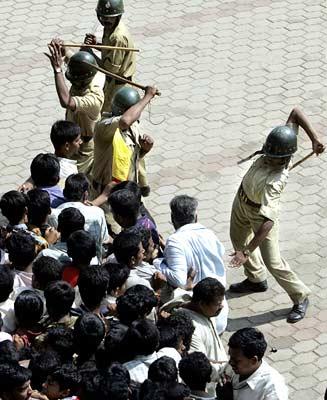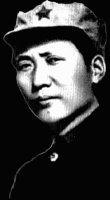Land acquisition evokes violent protestsWhen 12 tribal men lost their lives in police firing while protesting against the takeover of their lands in a backward village in Orissa, it represented, in many ways, the first major struggle in the battle for land.
Similar protests started all across Orissa.
All the mega projects, such as those proposed by Posco, Tata Steel, Vedanta, Utkal Alumina, are today facing opposition from locals during acquisition of land.
Posco had initially asked for 5,000 acre for its project, displacing 2,000 families. But to minimise local resistance, it brought down land requirement to 4,000 acre, comprising 3,500 acre of government land and the rest private land.
However, it failed to cool tempers and local resistance has continued.
The proposed Posco site today leaves out thickly populated villages, with the number of families to be displaced now at 450.
But, it is still facing maximum opposition from the villagers of Dhinkia, who have raised a roadblock preventing the entry of the company and the government officials for socio-economic and land survey required for payment of compensation.
Though the Orissa government had issued 4/1 notification for land acquisition in May 2006, no private land has been acquired yet.
The project has been delayed by six months due to local resistance.
The 2,000 acre Tata Steel site at Kalinga Nagar in Jajpur district for a 6 million tonne steel plant incorporates the Kalinga Nagar Industrial Complex set up in the early 1990s. But the local people here too are agitating for more compensation.
About 700 families, who had sold land to the government in the 1990s, continue to live in Kalinga Nagar in the absence of land utilisation. Demanding higher compensation for the land sold in the 1990s, they opposed the construction of a boundary wall by Tata Steel, leading to a violent clash between the protesters and the police force on January 2, 2006, which killed 12 agitators and saw one policeman being hacked to death.
Utkal Alumina’s 1 million tonne alumina refinery project worth Rs 4,000 crore, a Hindalco venture, has similarly been stalled by local opposition.
In Chhattisgarh, land acquisition is similarly stalled because of protests by villagers at all major investment sites. Tata Steel’s proposed 5 mtpa Rs 10,000 crore steel plant in Bastar district is facing stiff resistance from the residents of 10 villages in Lohandiguda block.
The Bastar district administration had earlier reported that villagers had passed a resolution in the Gram Sabha, mandatory under the Panchayati Raj Act, for land acquisition, but the process has collapsed after people alleged the vote was falsely obtained and refused to hand over their land.
Interestingly, the Left leaders support them, though they are pushing through land acquisition in Singur and elsewhere in West Bengal.
The Chhattisgarh villagers have submitted 13 demands. “The demands are complicated and cannot be fulfilled,” said a senior state government official. One demand is land for land and has been rejected by the government.
Essar Steel sought 1,500 acre in two tribal villages — Dhuli and Bhansi – in the Maoist-hit Dantewada district for its 3.2 mtpa, Rs 7,000 crore unit. But, people of both the villages protested and refused to even turn up at the Gram Sabha convened two months ago to pass a resolution for handing over the land.
“We will soon convene another Gram Sabha,” Dantewada Collector K R Pishda said.
IFFCO’s Rs 6,500, 1,300 mw power plant proposal for Sarguja district is facing land acquisition problems too, from five villages near Premnagar, as residents have opposed the proposal, Sarguja Collector Manoj Pingua admitted.
In Jharkhand, discontent has erupted in the form of road blockades, non-cooperation and agitation by farmers against acquisition of cultivable land for proposed units.
Top state officials admitted that the success of the farmers’ movement in embarrassing the West Bengal state government over the land takeover in Singur has led to intensification of protests by landholders against land acquisition.
Investors in Jharkhand are seeking land for plants close to iron ore and coal mines in the East and the West Singhbhum districts. The banned ultra-outfit CPI Maoist in Jharkhand recently started an agitation against the probable move of the UPA-supported coalition government led by Madhu Koda for acquisition of land.
Till recently, Maoist activity was limited to poster campaigns and warnings to industrial houses.
The Jharkhand Mukti Morcha (JMM) has a strong base in the mineral-rich districts and after joining Koda’s ministry, it was opposing land acquisition inside the state Cabinet.
In the days of the NDA government in Jharkhand, the tribals of the mineral-rich Kolhan area had formed a council to fight against the transfer of mines of Chiria, Ghutkuri, Noamundi, Kiriburu and Gua in Kolhan to non-tribals and companies. However, the council had not yet started any agitation against the mining lease issue.
Local sources warned that the Kolhan council was waiting for the government’s revised compensation policy for those losing land and for tribal lands for which mining leases were being granted to outsiders. The Kolhan council agitation would begin then.
The situation in West bengal has reached a flash-point, with the 997 acre taken over for the Tata Motors’ project providing the trigger.
While locals, including women, strongly opposed the process in Singur, they were firmly removed and many arrested. The land is today acquired and fenced off, but the problem has now affected all of Bengal.
The farmers are being escorted by opposition parties, such as Trinamool Congress and SUCI, to farmers’ public meetings all over the state. The result: 2-3 hour road blockades all over the state on a daily basis, with more than a dozen locations being hit daily.
Passions are at such a high that land being fenced for a different purpose in Bangar, south of Kolkata, 80 km away from Singur, led to a huge local riot and arson.
The attack on a Tata Motors showroom in Kolkata has now evolved to repeated calls by opposition parties to boycott Tata products.
The difference in Bengal is that political parties are as active as the local communities in opposing land takeovers.
Link
















